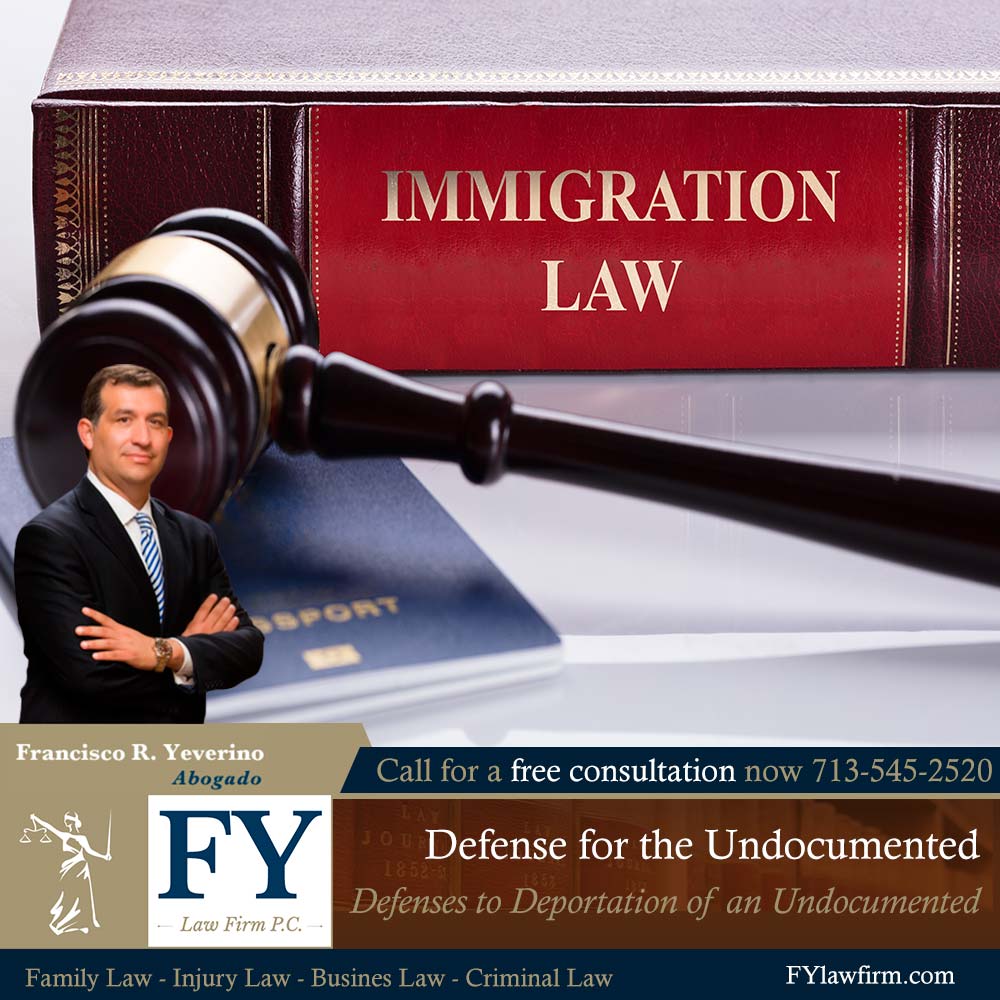
Houston Defense for the Undocumented
Possible Defenses to Deportation of an Undocumented Alien
Request Relief From Removal
Usually, it is the Immigration Judge (IJ) ,responsibility to tell anybody who is in removal proceedings what types of relief from removal the person appears to qualify for. However, an attorney can spend more time with you, and give you a fuller explanation of what types of relief might realistically be available to you.
If you are not represented by an attorney, it is a good idea to directly ask the judge, while on the record, what type of relief you might qualify for. This will let the IJ know that you know that it is his or her responsibility to advise you about all possible relief; and, more importantly, will encourage the judge to carefully review your case.
Of course, the IJ cannot accurately evaluate what relief you might qualify for unless you provide information about various aspects of your life, for example, your relatives in the U.S. with legal status, and how long you have been living here. Be prepared and open to providing the judge all of the information needed to figure out what type of relief you qualify for.
Some of the types of relief from removal that may be available to an undocumented immigrants who is in immigration court are:
Adjustment of status, most likely under Immigration and Nationality Act (I.N.A.) Section 245 or 245(i). This is a way of changing from nonimmigrant to immigrant status in order to get legal status in the United States. Usually (among other requirements) you have to have entered the U.S. legally to qualify for adjustment. But some exceptions to the legal-entry requirement are available.
Asylum. This is a form of protection for people who have fled persecution or fear future persecution in their home country, which allows legal status in the U.S., a work permit, and eventually a green card. See Asylum and Refugee Status.
Withholding of removal. Like asylum in many ways, withholding is more difficult to obtain, because you have to show that it is "more likely than not" that you would be persecuted in your home country upon return. Also, it provides fewer benefits than asylum, because recipients are usually ineligible to apply for permanent residence or travel outside of the United States. However, a person who gets withholding can stay in the U.S. and can get work authorization.
Protection under the Convention Against Torture (CAT). Protection under CAT is available only if it is "more likely than not" that your home country's government—or some person or group the government cannot control—will torture you. It does not matter why you would be tortured; the fact that it is likely that you would be tortured would be enough (unlike with an asylum case, where you must prove that the persecution is related to you fitting within one of five grounds). CAT is also like withholding in that persons who receive CAT protection cannot ever get permanent residence or travel internationally. But CAT recipients do usually receive permission to remain and work in the United States.
Cancellation of removal for persons who are not lawful permanent residents. This is a way of obtaining a green card if you can prove ten years' physical presence in the U.S., and can also show that your being removed would cause "exceptional and extremely unusual hardship" to your "qualifying relative" (a spouse, parent, or child who is a U.S. citizen or permanent resident).
Cancellation under the Violence Against Women Act (VAWA). Similar to cancellation of removal for non-permanent residents, an applicant for VAWA cancellation must show that he or she has been "battered or subjected to extreme cruelty" by a "qualifying relative" and meets other requirements, including three years of physical presence in the U.S. and good moral character.
Voluntary Departure. If all else fails, this offers way to leave the U.S. without staining your immigration record with a past order of removal (which can make returning to the U.S. even harder), as described in Voluntary Departure vs. Deportation. You should discuss with an immigration attorney whether voluntary departure would benefit you based upon your immigration history and how you entered the United States.
Deferred action. This is an agreement by the U.S. government to put your case on hold (neither give you legal status nor deport you). It is applied on a case-by-case basis, except that procedures have been formalized for certain young immigrants, as described in Who Qualifies for Deferred Action as an Immigrant Student or Graduate. You would need to speak to the government attorney handling your case to negotiate this relief.
Prosecutorial discretion. This is a decision by the government agency that is trying to deport you to stop trying to do so. If you receive prosecutorial discretion, you may be able to apply for work authorization but will not be eligible for other benefits such as the right to travel. Usually, persons whose cases are closed based on prosecutorial discretion do not have a criminal record, but there are no set-in-stone rules about who can receive this benefit. Like deferred action, prosecutorial discretion must be discussed with the government attorney handling your case.
Private bills. Laws passed by the U.S. Congress can help an immigrant receive relief from deportation. This occurs very rarely and only if there are highly sympathetic facts. Private bills are usually an option only if no other forms of relief are available.
There may be other defenses and forms of relief that apply to your particular case. It therefore makes a lot of sense to hire a licensed, competent, and experienced attorney if you are in removal proceedings and wish to avoid deportation.
source: nolo
If you are undocumented and need Legal Help for DWI or DUI, Without a License, Drugs' Possession or Domestic Violence. You can contact Attorney Frank Yeverino (713) 545-2520, who specializes in Undocumented Criminal Defense of the, he will take personally the call to assist you directly and quickly. The Fy Law Firm helps you.

keyword
Drunk Driving, Driving Under the Influence DWI, Driving Under the Influence DUI, Accidents, Personal Injury Compensation, Claim for Personal Injury, Personal Injuries, Possession of Drugs, Criminal, Drug Related Offenses, Drug traffic, Possession of Marijuana, Domestic violence, False Charges of Violence, Arrest for Domestic Violence, Family Cases, Divorces, Legal Custody of Children, Child Support, Alimony, Driving without a Driver's License, Driving without a License, Arrest for Driving without a License, Drive with Expired License, Locate my husband with the ID, Federal Crimes, Undocumented, Criminal Defense for the Undocumented, Criminal Defense for Immigrants, Defense for Immigrants, The Fy Law Firm

